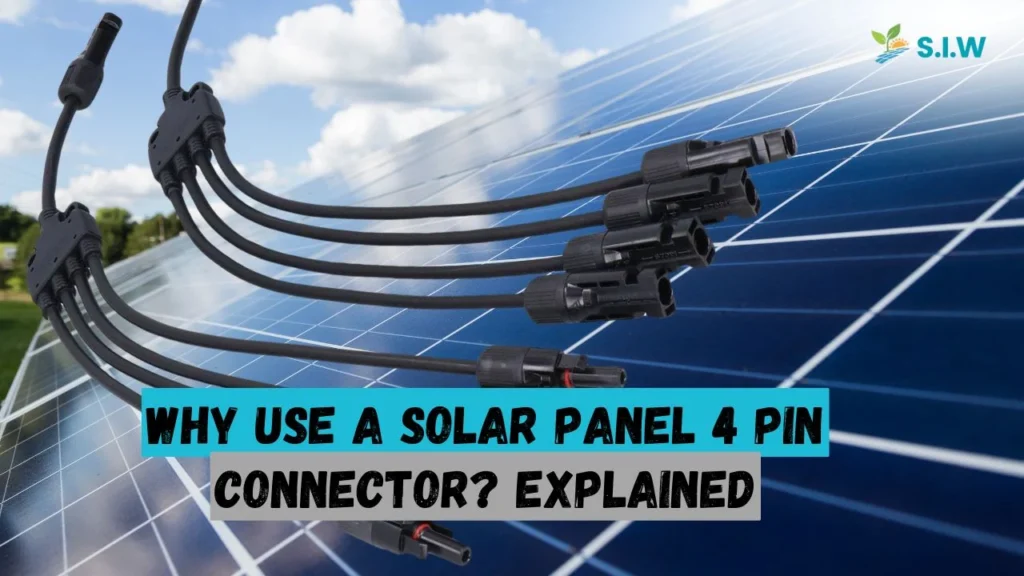If you’ve been around solar energy systems, you might have come across the term “solar panel 4 pin connector.” But what is it, and why is it so important? Whether you’re installing solar panels on your rooftop or planning a solar project for your business, choosing the right connectors ensures smooth energy transmission and system reliability.
In this article, we’ll break down everything you need to know about solar panel 4 pin connectors in simple terms. By the end, you’ll understand why these connectors are crucial for solar systems and how they can make or break your energy output.
What is a Solar Panel 4 Pin Connector?
A solar panel 4 pin connector is a specialized electrical connector used to join different parts of a solar energy system. Think of it like a bridge that ensures electricity flows smoothly from one point to another, connecting your solar panels to inverters or other components. Without reliable connectors, your solar system may not work as efficiently.
How Does a 4 Pin Connector Work in Solar Systems?
The 4 pin connector uses four contact points to transfer electrical signals between connected devices. These connectors allow the flow of both positive and negative current, while also supporting grounding and communication functions. Their design helps reduce energy loss and ensures that the system runs at optimal performance levels.
Why Are Connectors Important for Solar Panels?
Solar connectors play a crucial role in system efficiency. Just like a hose with leaks wastes water, poorly connected solar systems lose electricity. The right connectors ensure minimal resistance, keeping the energy flow uninterrupted. They also prevent issues like overheating or voltage drops, which can damage the equipment over time.
Types of Solar Panel Connectors
There are different types of connectors in the solar market, and each serves a unique purpose:
- MC4 Connectors: Most commonly used in residential and commercial solar systems.
- 4 Pin Connectors: Provide more versatility for complex setups, including monitoring and control signals.
- T-Branch Connectors: Useful for parallel connections between multiple solar panels.
Key Advantages of Using 4 Pin Connectors
1. Reliable Energy Transfer
A 4 pin connector ensures consistent energy transmission with minimal power loss.
2. Weather Resistance
Most 4 pin connectors are weatherproof and designed to withstand outdoor conditions, including rain, dust, and UV rays.
3. Versatility
These connectors can manage both power and data transmission, making them ideal for advanced systems that require monitoring.
How to Choose the Right 4 Pin Connector for Your System
When selecting a connector, you need to consider:
- Compatibility: Ensure the connector matches your solar panel and inverter specifications.
- Current Rating: Choose a connector that can handle the current output of your system.
- Weatherproofing: Look for connectors with IP67 or higher ratings for outdoor installations.
Installation Tips for Solar Panel Connectors
- Follow Manufacturer Guidelines: Every connector has unique installation steps; following the manual ensures proper setup.
- Use the Right Tools: Tools like crimpers and multimeters are essential for a secure connection.
- Check Connections Regularly: Over time, connectors can loosen due to vibrations or thermal changes. Routine checks can prevent potential issues.
Common Issues with Solar Connectors and How to Fix Them
1. Loose Connections
Loose connectors can cause energy loss. Regular inspections and re-tightening can fix this.
2. Corrosion
Exposure to moisture can cause connectors to corrode. Using weatherproof connectors helps prevent this.
3. Overheating
Improperly connected cables may lead to overheating. Ensure proper contact to avoid this issue.
How Do 4 Pin Connectors Compare to Other Connector Types?
Compared to standard MC4 connectors, 4 pin connectors offer additional flexibility. While MC4 connectors are suitable for simpler systems, 4 pin connectors are ideal for setups requiring data communication and control functions alongside power transmission.
Safety Considerations When Using Solar Connectors
- Turn Off Power During Installation: Always disconnect power before working on electrical connections.
- Use Insulated Tools: This reduces the risk of electrical shocks.
- Inspect for Damage: Damaged connectors can pose safety risks, so replace them immediately.
Future Trends in Solar Panel Connections
The solar industry is constantly evolving, and connectors are no exception. We’re seeing trends toward:
- Smart Connectors: Connectors with built-in sensors for monitoring performance.
- Wireless Options: Efforts are being made to reduce wiring complexity.
- Eco-friendly Materials: New designs focus on sustainability by using recyclable materials.
Final Thoughts
Choosing the right connector for your solar system is as essential as selecting the right panels. A solar panel 4 pin connector offers reliable energy transmission, weather resistance, and versatility, making it a top choice for modern solar systems. By ensuring that your connectors are installed correctly and maintained regularly, you can optimize your solar energy output and extend the lifespan of your system.
FAQs
- What makes a 4 pin connector better than other connectors?
A 4 pin connector offers both power and data transmission, making it more versatile than standard MC4 connectors. - Can I install 4 pin connectors on my own?
Yes, but it’s recommended to follow the manufacturer’s instructions and use the correct tools for installation. - Are 4 pin connectors waterproof?
Most 4 pin connectors come with IP67 or higher ratings, ensuring they are waterproof and suitable for outdoor use. - What happens if a connector becomes loose?
A loose connector can cause energy loss or overheating. Regular inspections can help you catch and fix such issues early. - Do 4 pin connectors support monitoring systems?
Yes, they are compatible with systems that require both power and communication signals, making them ideal for advanced setups.








